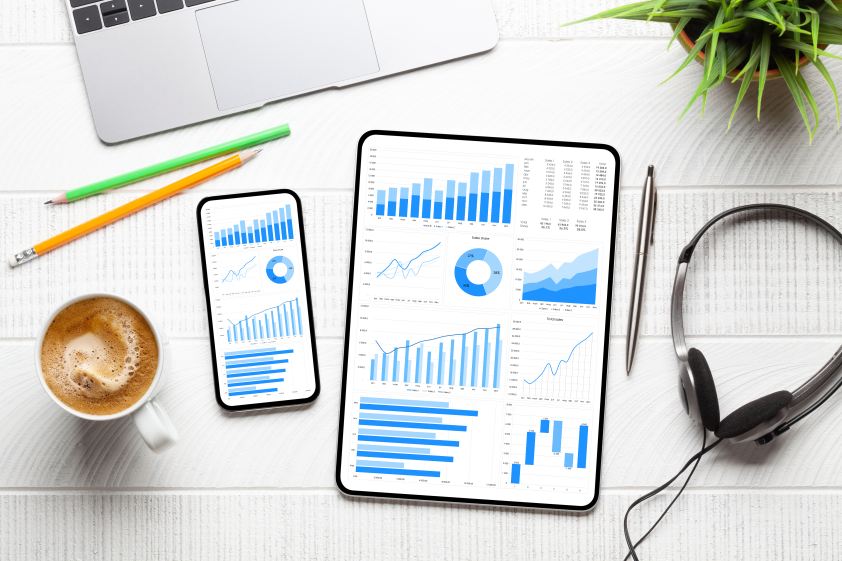Marketing analytics software, a modern game-changer, encapsulates the processes and technologies that enable marketers to evaluate the success of their marketing initiatives. This is done by measuring performance using important business metrics, like ROI, marketing effectiveness, and customer engagement. The essence of the best marketing analytics software lies in their ability to harness data from various marketing channels and consolidate it to provide a common marketing view.
In today’s competitive landscape, harnessing insights from marketing data analytics software is more critical than ever. The importance of marketing analytics stems from its ability to tap into consumer’s journeys and understand their behavior and preferences. This, in turn, empowers businesses to strategize and execute targeted marketing campaigns, bolstering their market size and revenue generation.
The Shift from Gut-Driven Decisions to Data-Driven Strategies
In the past, many businesses relied heavily on intuition, past experiences, and gut feelings to make strategic decisions. While this approach did yield results in certain contexts, it was often inconsistent and lacked the precision that today’s dynamic and competitive market demands.
With the dawn of the digital age and the availability of vast amounts of data, businesses have realized the value of leveraging this data to inform their decisions. Data-driven strategies are now becoming the norm rather than the exception. By analyzing data from various sources, businesses can:
Identify patterns and trends. This provides insights into customer behavior, preferences, and emerging market trends, allowing businesses to anticipate changes and adapt accordingly.
Make informed decisions. Businesses can test hypotheses, evaluate campaign performance, and optimize marketing strategies based on real-time feedback and metrics.
Mitigate risks. Data analytics can help forecast potential challenges, enabling businesses to prepare and implement counteractive measures.
Increase ROI. Through targeted marketing campaigns, personalized recommendations, and efficient resource allocation, businesses can achieve a better return on their investments.
The Role of Analytics in Customer-Centric Marketing
Today’s consumer is well-informed, discerning, and has a plethora of choices at their fingertips. This has placed the onus on businesses to shift from product-centric strategies to customer-centric ones. Here’s where marketing analytics plays a pivotal role:
Understanding the customer journey. Analytics provides insights into every touchpoint a customer interacts with, from awareness to purchase, and even post-purchase engagement. This allows businesses to enhance the customer experience at each stage.
Personalization. By understanding individual customer behaviors and preferences, businesses can offer tailored experiences, product recommendations, and content, making interactions more relevant and engaging.
Segmentation. Analytics helps segment the customer base into distinct groups based on demographics, behavior, purchase history, etc. This segmentation enables more targeted and effective marketing campaigns.
Predictive analysis. Advanced analytics can predict future customer behaviors, allowing businesses to proactively address needs, capitalize on opportunities, or mitigate potential challenges.
In conclusion, marketing analytics is no longer a ‘nice-to-have’ but an essential component in a business’s toolkit. As the market continues to evolve, businesses that harness the power of data will find themselves better positioned to cater to their customers’ needs and thrive in the competitive landscape.
Key Players in the Marketing Analytics Software Market: Who They Are?
As of today, the market for software for marketing analytics is vibrant and growing, with numerous key players bringing their unique offerings to the table. Adobe’s Marketing Cloud, Salesforce’s Marketing Cloud, and Oracle’s Marketing Cloud have emerged as the industry frontrunners. These platforms deliver comprehensive solutions that extend beyond basic analytics, offering marketing automation and customer journey mapping.
SAP’s marketing analytics software, IBM’s Watson Marketing, and Microsoft’s Dynamics 365 are other prominent contenders in the field. These companies’ software solutions empower businesses with data-driven decision-making capabilities, serving as a testament to the increasing adoption rate of marketing analytics software.
In contrast, the advantages of custom software provides greater flexibility, ensures better data privacy and security, integrates seamlessly with other tools, and can offer a distinct competitive edge in a crowded marketplace. While the aforementioned industry giants cater to a wide audience, there’s undeniable value in customization that aligns closely with a business’s specific goals and challenges.
Want to leverage the power of marketing analytics software with real-time statistics and trends?
Contact Growth Hackers
Market Trends
To comprehend the current industry dynamics, let’s delve into the emergent trends in the online marketing analytics software market.
Emergence of AI and Machine Learning in Marketing Analytics
Artificial Intelligence and Machine Learning are revolutionizing the landscape of marketing analytics. They play an integral role in predictive analytics, helping businesses forecast market trends and user behavior. This enables companies to customize their marketing strategies to cater to prospective consumer demands.
Increased Demand for Real-Time Analytics
In the era of immediacy, real-time analytics has become a sought-after feature in marketing analytics software. Businesses strive for up-to-the-minute insights to adapt quickly to customer behaviors and market trends. This, in turn, leads to improved customer engagement and retention.
Rising Importance of Social Media Analytics
The prevalence of social media in contemporary life has made social media analytics essential for businesses. Understanding user behavior on these platforms can drive successful marketing campaigns and increase market penetration.
Future Projections
While the current landscape of the marketing analytics software market is dynamic and exciting, the future holds even more promise.
Expected Growth of the Marketing Analytics Software Market
With an increasing number of businesses recognizing the potential of data-driven marketing, the market growth for marketing analytics software is projected to skyrocket. The marketing analytics market size is anticipated to experience substantial growth, driven by advancements in technology and an increased focus on personalized, customer-centric marketing strategies.
Predicted Market Trends and Innovations
Advancements in AI and Machine Learning are expected to further evolve the field of marketing analytics. Real-time and predictive analytics will become more sophisticated, and the integration of marketing analytics software with other business systems will become more streamlined. As market saturation increases, businesses will turn to innovative analytics solutions to gain a competitive edge.
Potential Challenges and Opportunities
Despite the bright prospects, the path to widespread adoption of marketing analytics software isn’t without challenges. Data privacy concerns and the steep learning curve associated with these sophisticated tools are among the potential hurdles. However, these challenges also present opportunities. Companies that can provide user-friendly, secure software solutions will likely gain a significant market share.
Revolutionize your strategy – harness the power of data with marketing analytics now!
Success Stories of Companies using Marketing Analytics Software
One notable success story is the global fast-food chain, McDonald’s, which leveraged marketing analytics software to understand customer preferences, leading to the successful launch of its all-day breakfast menu. Their use of analytics to guide marketing decisions led to significant revenue growth.
Aside from McDonald’s, other companies have also leveraged marketing analytics software with great success, resulting in impactful business transformations.
An entertainment company that owes much of its success to strategic data use is Netflix. The streaming giant used advanced marketing analytics software to examine viewer preferences and behavior in excruciating detail. This data analysis guided Netflix’s original programming, culminating in highly successful shows like “House of Cards” and “Stranger Things.”
Netflix’s analytics helped them identify that their viewers loved political dramas, Kevin Spacey, and David Fincher. Combining these insights led to the creation of “House of Cards,” which was a massive hit. By understanding and leveraging user behavior, Netflix was able to increase viewer engagement and subscription rates dramatically.
American Express (Amex), a multinational financial services corporation, has also effectively utilized marketing analytics software to anticipate customer needs and improve services. They developed predictive models to analyze historical transactions and forecast potential churn. This allowed Amex to identify customers who were likely to close their accounts within the next few months.
With these insights, American Express launched targeted retention campaigns, offering tailored solutions to address individual customer’s concerns. As a result, Amex saw a significant reduction in customer churn rate, increased customer loyalty, and improved profitability.
These success stories underscore the potential of marketing analytics software. By harnessing these tools, companies can generate valuable customer insights, enhance marketing effectiveness, and ultimately drive business growth.
Lessons Learned from Failures
On the flip side, an over-reliance on analytics without considering the human element can lead to failure. For instance, a major clothing retailer implemented a data-driven personalized marketing campaign. However, it backfired as customers felt their privacy was invaded. This highlights the need for balance and respect for consumer privacy in marketing strategies.
Closing Thoughts About Marketing Analytics Software
As we navigate the present and look towards the future of marketing analytics software, it’s evident that this technology plays a pivotal role in shaping successful marketing strategies. Its impact on business metrics, ROI, and consumer engagement has been transformative.
The current marketing analytics software market size and the expected growth underline the significance of these tools in today’s business landscape. However, staying informed about market trends in marketing analytics software is crucial, as the landscape is continually evolving.
From harnessing AI to real-time and social media analytics, businesses need to keep abreast of the latest trends and advancements. Understanding the potential challenges and opportunities can also help businesses prepare better for future trends. By doing so, they can optimize the use of marketing analytics software, leveraging data-driven insights to steer their marketing campaigns towards success.
Growth Hackers is offers top-notch data analytics services helping businesses from all over the world grow. There is no fluff with Growth Hackers. We help entrepreneurs and business owners supercharge their marketing efforts with analytics software, increase their productivity, generate qualified leads, optimize their conversion rate, gather and analyze data analytics, acquire and retain users and increase sales. We go further than brand awareness and exposure. We make sure that the strategies we implement move the needle so your business grow, strive and succeed. If you too want your business to reach new heights, contact Growth Hackers today so we can discuss about your brand and create a custom growth plan for you. You’re just one click away to skyrocket your business.








